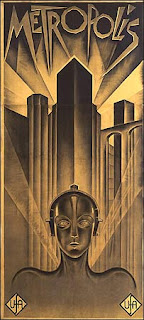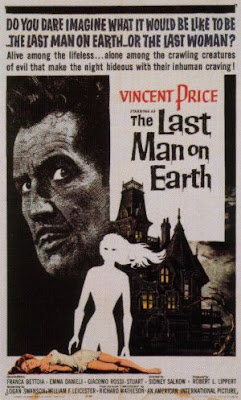Horror Classic 19 of 50: METROPOLIS
 First of all, a note for those of you who aren't familiar with this film: Metropolis is not a film about Superman's city of residence.
First of all, a note for those of you who aren't familiar with this film: Metropolis is not a film about Superman's city of residence. Second of all, a question: What the hey? Metropolis, the silent German classic directed by Fritz Lang in the 1920s, has fallen into the public domain like the rest of the films on the 50-movie Horror Classics DVD set -- or at least, versions of it have.
But there are two reasons I'm surprised to see it included here: 1. It's considered a genuinely classic film, a distinction not traditionally associated with the likes of The Mad Monster and The Invisible Ghost, and 2. It's not a horror film, and anyone who has seen it would know that it fits much more logically into the category of science fiction.
Perhaps the folks at Mill Creek Entertainment are reading this right now, and perhaps they'll slap their foreheads and realize, "Of course this isn't a horror movie! What were we thinking! Let's take out an ad in a bunch of newspapers to tell everyone how awesome this Ryan fella is!"
Anyway. The movie.
Synopsis
The city of Metropolis is a futuristic place with towering skyscrapers, where important men conduct their business, men like John Fredersen, the "Master of Metropolis." He's a ruthless dude who spends 99% of his screen time glowering. He never gives much thought to the workers who toil in the machine rooms far below the city, and who live underground even farther below the city. Here, I drew you a map:

Got it? I'll get to the "catacombs" part in just a minute. Our story gets going when Mr. Fredersen's son Freder (Is that a nickname, or is he Freder Fredersen?), who is accustomed to living the life of a well-to-do Metropolitan, sees some of the filthy, miserable workers for the first time. His curiosity leads him down to the machine rooms, where he witnesses an accident that results in the death of two laborers. He's so moved by this that he ends up working one of the machines by himself for a while... but I can't figure out what the heck he's accomplishing, as it looks like he's just spinning the hands of a giant clock around.
Later, Freder ventures down to the catacombs (a-ha!), where thousands of workers secretly gather to listen to the lovely Maria, who tells the story of the Tower of Babel. In her version, the moral of the story is that there must be a mediator (the "heart") between the "brains" who design civilizations and the "hands" that build them. I always thought the point of the Tower of Babel story was that God doesn't like human hubris, but I think I first heard the story from two talking mice on a children's record so I may have missed something. Anyway, Maria tells everyone not to worry, that their "heart" mediator person will come to them soon and things will get better.
Freder is immediately smitten with Maria, and it turns out she likes him too. They even smooch! Unfortunately, this is a silent film so he can't sing "I just met a girl named Maria..." Freder is now completely on board with the "Filthy, miserable laborers are people too!" philosophy. But guess who's spying on the meeting in the catacombs? It's Mr. Fredersen, senior, and his scientist pal Rotwang. Rotwang, by the way, would be a really embarrassing name to have in junior high school.
Fredersen doesn't like Maria, what with her giving hope to the masses and everything, so he conspires with Rotwang: The scientist will kidnap Maria and build a robot that looks and acts exactly like her. The robot will take her place and sow dischord among the workers.
Long story short, it works... a little too well. Robot-Maria ends up convincing the workers to revolt, and they go nuts, even shutting down the power to their own underground city, which means their homes get flooded. Which is pretty stupid. In the end it'll take some heroism from Freder and a heaping helping of determination from the captive Maria to save the day. Oh, and it's maybe just somewhat a little bit possible that a certain character in the movie will turn out to be the "heart" the workers have been waiting for.
Is It Scary?
If you can read, you probably noticed up there where I said this is not a horror movie. Still, I guess it's pretty frightening to think of a possible future where there are only two social classes and one of them never gets to see the light of day.
Lessons I Learned
- Robots are great dancers!
- Before participating in a riot, first ensure that said riot will not cause your children to drown.
"..................................................." (It's a silent film, remember?)
Body Count
I guess there were only two confirmed, onscreen deaths, but many more were implied.
Comments
•In addition to being the first silent film in this DVD set, Metropolis was also the longest so far, at 119 minutes. And yet it held my attention much more than the vast majority of these movies have. It has a real story, with characters who have actual motivations, and there are themes and symbolism and literary allusions.
And the effects! Sure, the special effects technology is 80-something years old, but it's still impressive. The miniatures and sets add up to a completely convincing city of the imaginary future, and I'm still not sure how they did the Maria-Robot transformation scene. According to IMDb, the budget for Metropolis is equal to about $200 million when adjusted for inflation, which, yowza, but it's all up there on the screen, from the thousands of extras to the epic flooding of the underground city sequence.
•The role of Maria was played by Brigitte Helm, and she was excellent. Even with no audible dialogue she made it obvious that Real-Maria and Robot-Maria were different characters, and she was appropriately fearless during the sequence where the robot is introduced and does a frantic sexy dance for a roomful of appreciative men.
•When Freder sees the workers killed in the machine room, he briefly hallucinates that one of the furnaces is a monster, and he says, "MOLOCH!" How does he know that monster's name? Am I supposed to know who Moloch is?
•I don't think the music on the DVD was really synchronized to the film. Every once in a while the mood of the music would coincide with the action, but I'm guessing somebody took the score from some other public domain film and threw it on this one. I toyed with the idea of putting a CD and seeing if it just happened to match, but I had no idea what might fit. Any suggestions?
•I think the film would be several minutes shorter if the camera didn't seem to linger just a little bit too long on every shot. I don't know if it's a result of different frame rates or if it's just the way movies were edited back then, but there's enough space at the end of every shot that at times I felt like yelling things at the characters, Rocky Horror Picture Show style.
Letter grade for Metropolis: A (a Horror Classics blog first! And probably last!)
Next film in the 50-movie set: The Vampire Bat. It will probably not receive an A.



Comments
Back in high school, when I was briefly obsessed with this movie, I tried making up my own soundtrack to it since the one paired with the film was so awful. That didn't work so well, but I did manage to discover that the scene were Rotwang sneaks after and kidnaps Maria pairs up signficantly well with Radiohead's "Climbing up the Walls."
--Sara
I reckon there are others who have made their own Metropolis soundtracks. Climbing the Walls does seem like a good choice, and I bet there are some other Radiohead songs that fit other scenes. What other songs were in your alternate soundtrack?
You know, I don't make myself watch silent films nearly often enough, but every time I do I'm glad I did.
Also, there was a home video release of Metropolis that included a new rock soundtrack, which sounds pretty intriguing.
--Sara